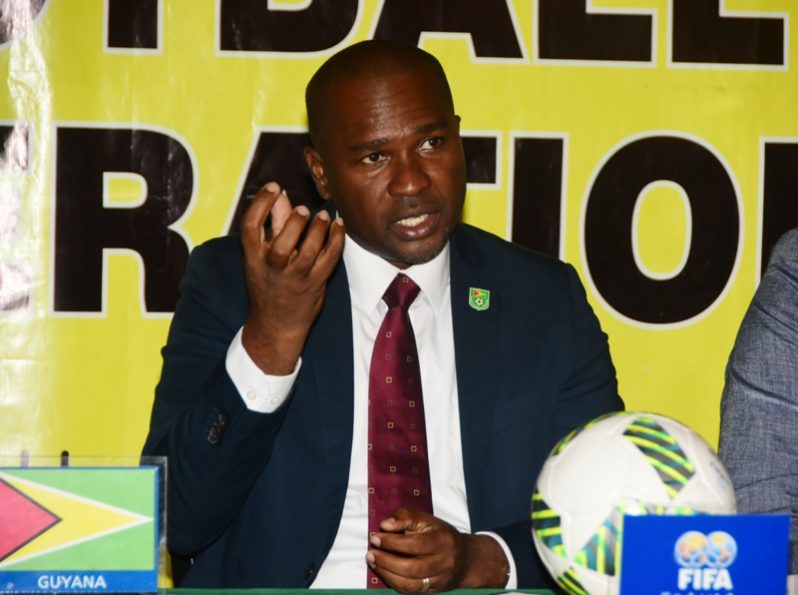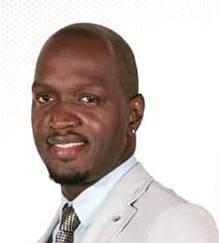Wayne Forde, president of the Guyana Football Federation (GFF), made it clear that Guyana will be supporting the joint North American bid from the United States, Canada and Mexico to host the 2026 World Cup .
Voting will take place when FIFA’s Congress vote on who will be the host for the first world cup in which 48 teams will be taking part..
In an attempt to make the bidding process more transparent, there will be an open ballot for the 2026 FIFA World Cup hosting rights, after FIFA’s Council approved the voting regulations for the game’s most spectacular event.
The FIFA Congress will convene on June 13 in Russia to vote on the host of football’s showpiece, with Morocco and a joint North American bid from the United States, Canada and Mexico, being the only bids in play.
Forde will be accompanied to Russia by Executive Committee member Dion Innis and General Secretary Rennella Bourne.
“It’s just good manners, if you’re at home, you look after home,” Forde told reporters when responding to Chronicle Sport at a press conference on Thursday to the question of which of the two bidders will have Guyana’s vote.
In an article published on April 6, 2018 in the Guyana Chronicle, Forde had told this publication that Guyana’s support was wide open, since GFF was “not been directly approached by any of the two groups bidding to host the World Cup.”
However, Forde, this time around, is singing a song of praise for the joint bid, telling the media that “if we’re (joint bid) successful in bringing it into our confederation, then it’s going to be the most profitable world cup in the history of the FIFA world cup. It’s projected that it’s going to somewhere around $11.5B to $12.5B in profit so why would we not want to do that.”
Of course we would want to see some of that revenue being invested in particular in infrastructure in Guyana so of course I’ll be supporting the joint bid of North America,” Forde firmly stated.
Asked by Chronicle Sport if the GFF will take into consideration that they have never played the USA or Canada, and only faced Mexico when the Golden Jaguars reached the penultimate stage of the 2014 World Cup Qualifier, Forde acknowledged in the affirmative, but said there are other factors that need to be taken into consideration.
The GFF boss said the current CONCACAF president, Victor Montagliani, would’ve made significant strides in bridging the gap between the usual powerhouses in the confederation and their Caribbean counterparts, and pointed to the CONCACAF Nations League as a prime example.
“Montagliani has brought in a new culture of inclusiveness within the operation of football. The Nations League is a good example of breaking that divide. He understands that you can’t have a confederation where you have a handful of the countries doing well, and the bulk struggling,” Forde said.
Despite having 31 associated countries in the Caribbean Football Union (CFU), only 25 will be eligible (six are not affiliated to FIFA), meaning that the Caribbean’s vote will be vital to the USA, Canada and Mexico.
While other continental confederations are likely to vote in blocs, CONCACAF is seeing its support for the North American bid split.
The race between the North American bid and Morocco is much closer than expected, despite the joint bid having the required infrastructure already in place.
FIFA inspectors have awarded North America’s 2026 World Cup bid a significantly higher score than Morocco in an evaluation report, and have warned voters that the North African nation’s bid is high risk due to a lack of infrastructure.
The report puts pressure on the FIFA congress to follow the verdicts from inspectors, who marked the joint bid from the US, Canada and Mexico at 402 out of 500 and flagged Morocco’s proposals on stadiums, accommodation and transport as high risks in a score of 275.
The five-person Fifa-appointed task force said it “considers it its duty to emphasise the significant overall risk” of a country needing to build so many key assets, concluding that the bids are at “almost opposite ends of the spectrum.”





.jpg)








